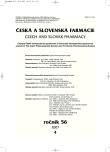-
Medical journals
- Career
Applications of molecularly imprinted polymers in analytical and pharmaceutical chemistry
Authors: M. Lachová 1; J. Lehotay 1; J. Čižmárik 2
Authors‘ workplace: Institute of Analytical Chemistry, Faculty of Chemical and Food Technology, Slovak University of Technology, Bratislava, Slovak Republic 1; Department of Pharmaceutical Chemistry, Faculty of Pharmacy, Comenius University, Bratislava Slovak Republic 2
Published in: Čes. slov. Farm., 2007; 56, 159-164
Category: Review Articles
Overview
The paper reviews recent developments in the use of molecularly imprinted polymers in several analytical techniques, such as solid-phase extraction, liquid chromatography, capillary electrophoresis, capillary electrochromatography, and as selective sorbents in chemical sensors. Molecular imprinting is achieved by the interaction between complementary groups in a template molecule and functional monomer units. The benefits of imprinted polymers are low cost, storage stability, high mechanical strength, repeated operations without loss of activity, and potential application to a wide range of target molecules.
Key words:
molecularly imprinted polymers – solid-phase extraction – liquid chromatography – electrochromatography – membranes – sensors
Labels
Pharmacy Clinical pharmacology
Article was published inCzech and Slovak Pharmacy

2007 Issue 4-
All articles in this issue
- Applications of molecularly imprinted polymers in analytical and pharmaceutical chemistry
- Interactions of food and dietary supplements with drug metabolising cytochrome P450 enzymes
- T-2 toxin: occurrence and detection
- Voltage gated calcium channels: structure, characteristics and terminology
- A study of the properties of tablets from the mixtures of directly compressible starch and directly compressible lactitol
- The effect of polymeric dispersion type on the release of diclofenac sodium from coated pellets
- Testing of antidiabetic and antioxidative effect of the flavonoid osajin in an experiment
- Czech and Slovak Pharmacy
- Journal archive
- Current issue
- Online only
- About the journal
Most read in this issue- Interactions of food and dietary supplements with drug metabolising cytochrome P450 enzymes
- Voltage gated calcium channels: structure, characteristics and terminology
- Applications of molecularly imprinted polymers in analytical and pharmaceutical chemistry
- T-2 toxin: occurrence and detection
Login#ADS_BOTTOM_SCRIPTS#Forgotten passwordEnter the email address that you registered with. We will send you instructions on how to set a new password.
- Career

